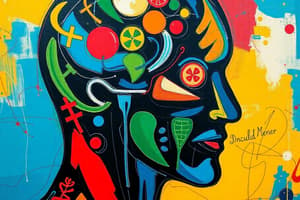Podcast
Questions and Answers
What characterizes the conditions of being overweight and obese?
What characterizes the conditions of being overweight and obese?
- Unhealthy body weight and maladaptive eating patterns (correct)
- Healthy eating habits
- Consistent physical exercise
- Positive energy expenditure
What is the essence of positive energy balance?
What is the essence of positive energy balance?
- Energy intake and expenditure are balanced
- Caloric intake consistently exceeds energy expenditure (correct)
- Caloric intake equals energy expenditure
- Energy expenditure is greater than energy intake
Which of the following is NOT one of the main types of eating disorders identified?
Which of the following is NOT one of the main types of eating disorders identified?
- Bulimia nervosa
- Binge eating disorder (correct)
- Anorexia nervosa
- Pica
According to self-determination theory (SDT), what is considered a universal motive?
According to self-determination theory (SDT), what is considered a universal motive?
What does achievement motivation refer to?
What does achievement motivation refer to?
What role do emotions play in motivation?
What role do emotions play in motivation?
Which of the following theories suggests that behavior is driven by the desire to reduce internal tension?
Which of the following theories suggests that behavior is driven by the desire to reduce internal tension?
What does the humanistic theory of motivation emphasize?
What does the humanistic theory of motivation emphasize?
Which statement accurately describes energy homeostasis?
Which statement accurately describes energy homeostasis?
What is the main purpose of various chemical messengers in the context of hunger and eating?
What is the main purpose of various chemical messengers in the context of hunger and eating?
What does the facial feedback hypothesis suggest about our emotional experiences?
What does the facial feedback hypothesis suggest about our emotional experiences?
According to Schachter and Singer's two-factor theory of emotion, what plays a crucial role in determining emotions?
According to Schachter and Singer's two-factor theory of emotion, what plays a crucial role in determining emotions?
What does the James-Lange theory of emotion emphasize as a central element of emotional experience?
What does the James-Lange theory of emotion emphasize as a central element of emotional experience?
What aspect of emotions do Schachter and Singer criticize in relation to James-Lange theory?
What aspect of emotions do Schachter and Singer criticize in relation to James-Lange theory?
Which statement best describes the relationship between emotion and bodily feedback according to the discussed theories?
Which statement best describes the relationship between emotion and bodily feedback according to the discussed theories?
Flashcards are hidden until you start studying
Study Notes
Motivation
- Motivation: refers to the internal and external forces driving an individual to act.
- Motivational Theories:
- Instinct theory: Innate behaviors driven by evolutionary programming.
- Drive theory: Individuals are motivated to reduce internal tension from unfulfilled biological needs.
- Incentive theory: External goals drive behavior.
- Arousal theory: Individuals seek optimal levels of arousal.
- Humanistic theory: Emphasizes psychological and cognitive factors, particularly self-actualization.
Hunger and Eating
- Hunger is a biological motive, but eating is influenced by biology, social factors, and psychology.
- Energy homeostasis: Balancing energy intake and expenditure.
- Short-term signals regulate eating, influenced by psychological and physiological factors.
- Long-term signals regulate body weight: Leptin, insulin, neuropeptide Y and corticotropin-releasing hormone influence eating behavior and energy expenditure.
Excess Weight and Obesity
- BMI is a numerical scale indicating weight relative to height
- Consistent excess calorie consumption contributes to overweight and obesity.
- Eating disorders involve maladaptive eating behaviors, often involving severe calorie restriction or overeating.
- Anorexia nervosa and bulimia nervosa are common eating disorders, typically developing in adolescence or early adulthood.
Psychological Needs as Motivators
- Maslow's hierarchy of needs: A model suggesting people aim to satisfy needs at each level of the hierarchy before moving to the next.
- Self-determination theory (SDT): People strive for personal growth and integration.
Competence and Achievement Motivation
- Competence motivation reflects striving to use skills effectively and exercise control.
- Achievement motivation is the drive to excel and outperform others.
Emotion
- Emotion is a psychological state with three components: subjective experience, a physiological response, and a behavioral/expressive response.
- Emotions influence decision-making by shaping perceived goals and their importance.
- Darwin observed emotional expressions across species, suggesting their evolutionary significance.
- Basic emotions are universally experienced.
Expression of Emotion
- Emotion expression includes facial expressions and non-verbal behavior.
Neuroscience of Emotion
- The sympathetic nervous system triggers physiological responses associated with intense emotions, such as fear.
- The amygdala plays a significant role in fear responses.
Theories of Emotion
- The James-Lange theory: Physiological responses are perceived, then labeled as emotions.
- Based on observations of bodily changes influencing emotional experience.
The James-Lange Theory of Emotion
- Environmental stimulus triggers bodily changes, which are then perceived as emotion.
Studying That Suits You
Use AI to generate personalized quizzes and flashcards to suit your learning preferences.




